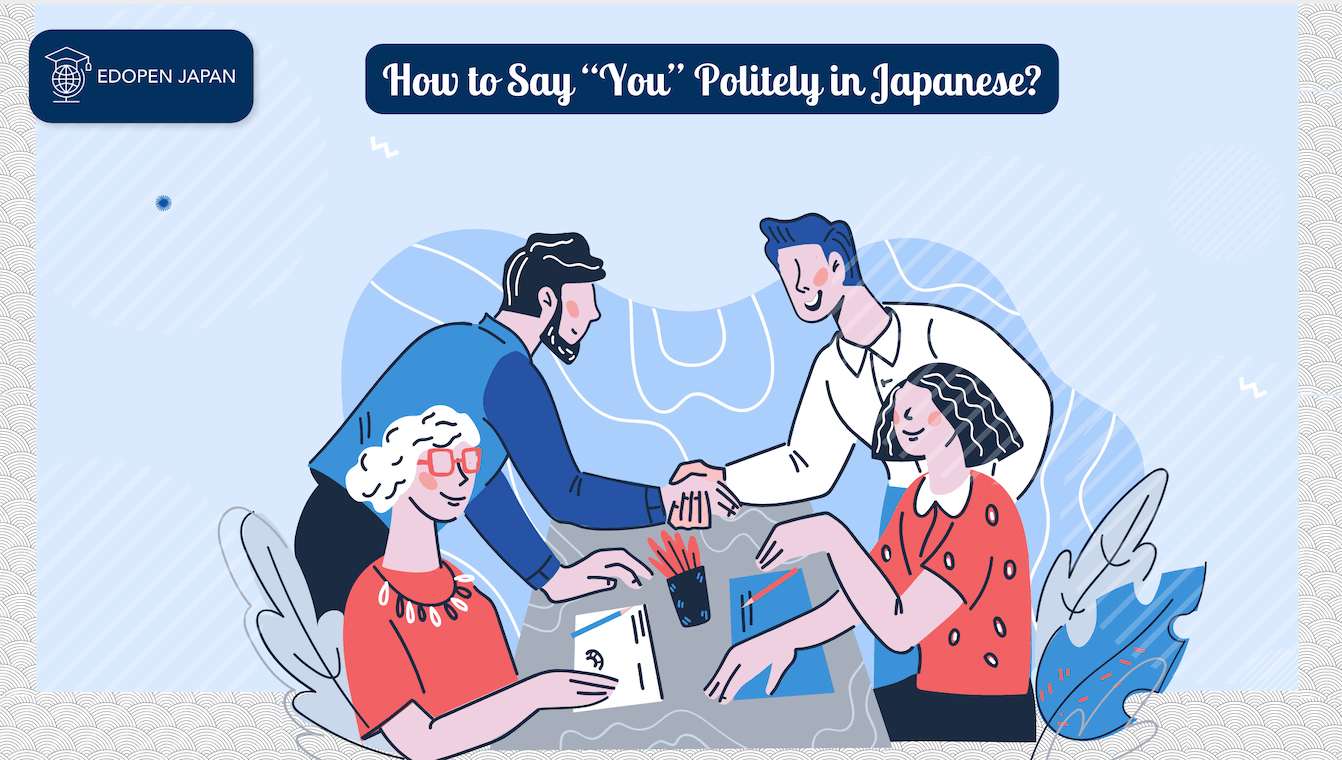Do you know how to politely as well as properly say “You” in Japanese? There are multiple ways to address others and various words that all mean “You” in Japanese. If you have learned Japanese before, you may know “Anata (あなた)” means “You”. However, the native speaker doesn’t use “Anata” so much actually.
As the other option, we can use the other many alternative phrases to address “You” in daily conversation in Japanese. Even if they all translate to the same word in English, it can be viewed as rude or offensive if the wrong word is used. Politeness and context are definitely a big part of Japanese culture.
Therefore, it is important to learn what kind of context is appropriate to use the words correctly. By reading this article, you would be able to learn and understand how to properly use “You” in Japanese. Let’s check it out!
In addition, if you are currently studying Japanese language and culture, understanding the proper use of certain phrases or sentences that are often used in everyday Japanese conversation will greatly help you become proficient and understand how native Japanese use them. Thus, please also read our comprehensive discussion below to broaden your horizons!
Read also:
How to Call Siblings in Japanese? Everything to Know
How are You in Japanese: All You Need to Know
How to Express I love you in Japanese?
Contents
The most common phrase used to address you in Japanese
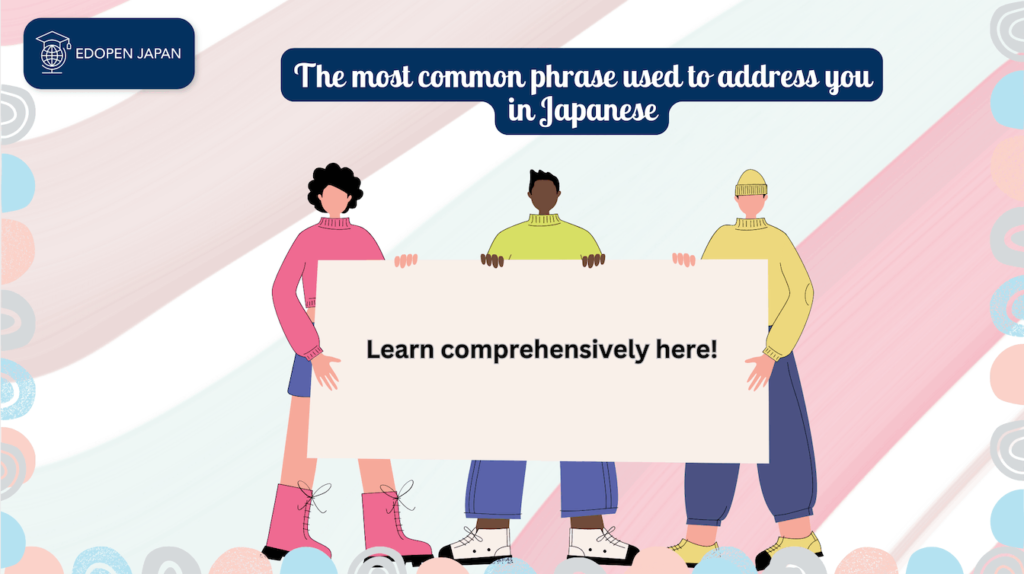
The most common way to refer to another person in a conversation is by their name or job title. While “Anata” translates to the pronoun you, it is only used when addressing a stranger or an acquaintance whose name you don’t yet know. This gives the word a slightly cold and distant tone.
Japanese people prefer to use each other’s names in private, or perhaps titles in a professional situation. For example, doctors, teachers, and professional artists all use the title 先生 (Sensei).
If you are speaking to someone in one of these professions, you can either say their last name and add Sensei, or you can use the title Sensei by itself. Either of these options is a more natural-sounding substitute for “Anata”.
Different ways of saying “you” naturally in Japanese
How many different ways can you think of to say “you” in your native language? In Japanese, there are many ways to refer to someone. There are many phrases in Japanese that mean “you”. If you have studied Japanese, you may hear “Anata [あなた]” which means “you”.
Of course, you can use “Anata [あなた]” to mean “you”. This is technically correct, but there are many other ways to say (or not say) “you” in Japanese, and some are much more commonly used by native speakers.
The word “you” is a pronoun. Pronouns are words like “I,” “you,” “they,” “we,” and so on, that replace nouns to avoid repetition. English pronouns come in many forms (e.g., I, my, me, mine), but they work a little differently in Japanese, so you need to learn a few more pronouns in order to address people with the proper level of politeness.
Here are five ways to say “you” in Japanese for very different occasions.
(1) あなた (Anata)
Typically written in hiragana, “Anata [あなた]” is the standard, polite way to refer to the listener in a conversation, although it is generally only used when you do not know the name of the person you are speaking to. It is usually used by women.
It is also used by many women to refer to their spouses. It can be said in an endearing way, like “darling” or a pet name in English, but it is also often used to express annoyance.
(2) 君 (きみ) Kimi
“Kimi [君]” is most often written in kanji. This is the word for “you” that most men would choose to refer to someone in casual conversation. “Kimi [君]” is meant to be used by people of higher status to those below them, such as adults to children and teachers to students.
It can also be used to express intimacy in a romantic way, as in 君の名は (kimi no Na wa) Your name, a romance anime. So it is also a word used by couples.
It should not be used when speaking to your boss or someone higher than you on the social ladder, as it expresses a level of familiarity that is inappropriate. You would risk sounding presumptuous because it indicates that you, as the speaker, feel that you are on the same level as or superior to the person you are talking to.
Although English pronouns do not carry as much cultural coding, looking at “Kimi [君]” and “Anata [あなた]” You should begin to see that it is important to consider who is speaking and who is being spoken to when choosing the correct “you” to use.
(3) あんた (Anta)
あんた (Anta) is originally a variation of “Anata [あなた]”, but with completely different implications and as such is less formal. Written in kana as “Anta [あんた]”, it is usually considered a rude and rough way to address the listener, expressing the speaker’s anger or disrespect.
In the past, “Anta” was used to address people above you, but nowadays it has a disrespectful connotation. Just like “Omae,” you can only use “Anta” if the person you’re talking to is below you, and even then it has a rude nature to it.
If you’re chastising someone for being careless, “anta” is appropriate. This pronoun is not used in polite conversation.
“You” – in Japanese It is overly familiar and can be quite offensive because it expresses the superiority of the speaker, although you will often hear it in anime, comedy, or TV drama. It means insulting, angry, and is used for rough and ready exclamations.
Both men and women may use it when jokingly roasting their closest friends or family. However, it is something that requires a refined ability to know how others might feel about it. If you are unsure, it is best to avoid it altogether, lest you accidentally offend someone.
(4) お前 (おまえ) Omae
This is a masculine and somewhat gruff way of saying “you” and can be unforgivably rude when used on a superior. It is often used by older male teachers when scolding naughty groups of students, though it should be emphasized that this is not a polite way to speak to them. It indicates that the speaker’s authority is considered high above those being addressed and is very informal.
In addition, it’s mainly used by men to call other men of the same level (as a kind of joke), you’ll notice Omae being exchanged like “bro” at a frat party. Men often use “Omae [お前]” in the same way that women use “Anata [あなた]” with their spouses, although it reinforces their assumption that they are superior in the couple.
How to use “あなた (anata)” politely in Japanese?
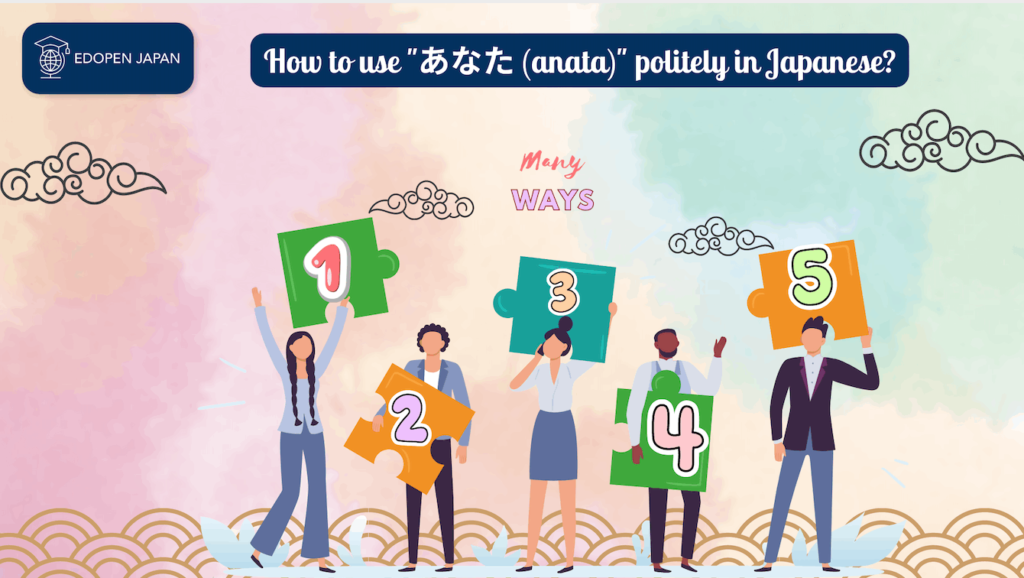
In English, even people who meet for the first time can easily call “You”, but in Japanese, they definitely call it “Person’s name”. If you are talking to Mr. Sato, call the other person “Sato-san”, and if you are talking to Mr. Tanaka, call him “Tanaka-san”. It’s almost impossible to suddenly call “Anata” to someone you meet for the first time. If you call it “you,” you’ll think you’re an unconventional person, and you’ll think of it as a bossy and arrogant personality.
The cultural meaning of the term “あなた (anata)”
The meaning of “anata” is originally a colloquial word used to “respect the other person. “Anata” was originally a “colloquial (spoken language) when calling with respect to the other person.
Nowadays, however, it is not used so much in everyday conversation and is not used for superiors. The pronoun “anata” used for the person in front of you is not appropriate for use with superiors.
Address someone higher than you by their title, such as “Sensei”, “Senpai”, and “Title” instead of “Anata”, or by the other person’s name, such as “Yamada-san” and “Taro-san”. In addition, using personal names such as “Taro-san/chan/Kun” becomes a friendly and polite expression.
Even if it is not the first meeting, but a close relationship, it is not called “Anata” unless it is rare. If you are close to a person, call them “Taro” if they are Taro, and “Hanako” if they are Hanako. Basically, when talking to a person, everyone calls them by their last name or first name.
In Japanese, calling a person by their name gives the impression that they are respected and valued. On the contrary, calling them “Anata” makes them feel cold and rejected.
The negative meaning of the term “あなた (anata)
The word “anata” has many negative connotations. It is a complete denial that “anata [you]” is never “I”. The existence of “anata” arises because it is absolutely not in “I” and because it is conscious of an individual that is separate and independent of “I”. “I” is not “you” and “you” is not “me”.
On the other hand, “I” can call the other person “you” because he is in an independent and completely isolated standing position, and because he can push the other person coldly and recover as a completely different person. In Japanese, “anata” means something like this image and nuance, so most Japanese don’t use “anata” in conversation. Please make sure you do!
Talking to groups and saying “you” in Japanese
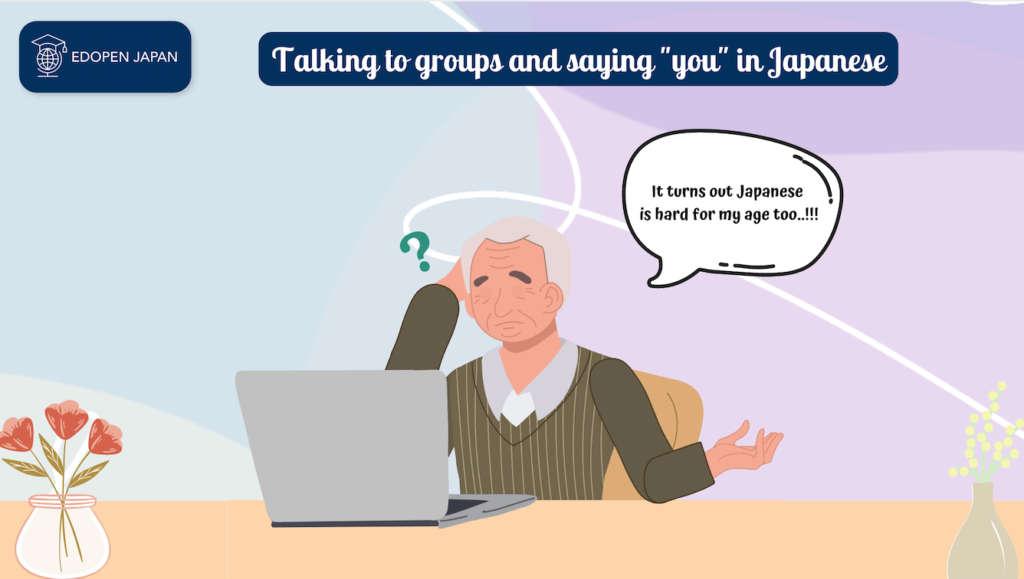
In English, “You” can mean one person or a group to whom the speaker is speaking. When “You” is used for more than one person, “You” is made by adding “Kata/Gata” and “Tachi” at the end of the word to indicate more than one person.
In Japanese, simply add “Tachi [たち]”, sometimes written with the kanji “達”, to pluralize “you” and refer to two or more people you are talking to (Example: “Kimi-tachi [君たち]”). A more polite way to do this, and one that is more appropriate for dealing with customers in a business setting, would be to use “Kata/Gata,” which raises the level of politeness.
The following is the quick examples:
(1) Anata-tachi (あなたたち)
(2) ~San-tachi (~さんたち)
(3) Sensei-gata (先生がた)
(4) Senpai-gata 先輩がた
Important tips on how to say “あなた (anata)” correctly in Japanese
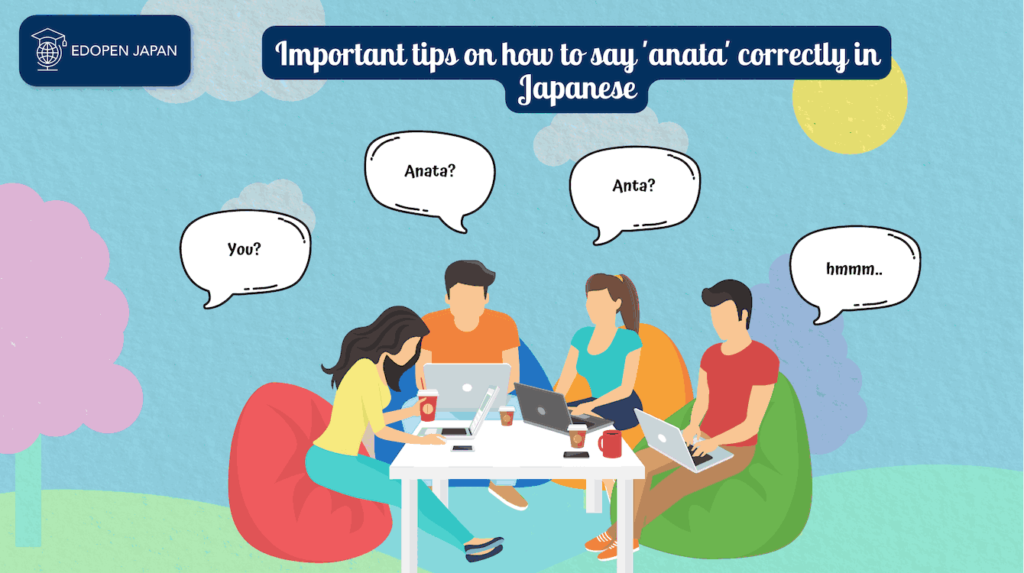
Rule 1: Don’t say “anata” (too much)
The first rule of saying “you” in Japanese is, as I mentioned before, you don’t say “anata” in Japanese! Japanese people actually use “Anata” when they don’t know anything about the person they are talking to. It is also the word used when you are not talking to a specific person (for example, saying “you” in TV commercials).
So why do textbooks use the word “anata” so often? Most of the time, it is just to help the learner understand the sentence. Since the information would be there in English, beginners automatically expect it in Japanese and get confused when it’s not there. Think of it as a training wheel.
Rule 2: Use the suffixes first
When Japanese explicitly state “you” information in their sentences, it’s correct to use the person’s (family) name and add a suffix. You’re probably already familiar with “San [~さん], which is a safe fallback suffix for learners.
| Suffix | Meaning |
| ~様 (Sama) | A very polite version of “San (さん)” |
| ~君 (Kun) | A suffix used toward men of inferior status/position |
| ~ちゃん (Chan) | A suffix indicating a high degree of familiarity and/or affection |
| ~殿 (Dono) | An older-sounding suffix that is usually attached to peoples’ titles (not their names). |
| ~氏 (Shi) | This suffix (which you’re most likely to see after the names of artists) is primarily for 3rd person references, rather than for the person you’re addressing. |
In official situations, it’s common to use a person’s title as a suffix after their name. Hence: トランプ大統領 (= Trump Daitouryou: Trump President).
As long as it’s clear who you’re referring to, you can even skip the name altogether and just use the title. People in high organizational positions (for example: 社長 (shachou: CEO) or 部長 (buchou: department head) are particularly susceptible to being addressed by their titles alone. 先生 (sensei) or “teacher” is the same way.
Conversely, calling someone by their name without any title/suffix is called “yobisute (呼び捨て)” in Japanese, and you should not do it unless you are on very intimate terms, and even then it is extremely rare to yobisute your superiors.
Rule 3: “You” words are dangerous
It’s important to remember that in Japanese, to politely address someone you should use their name with a suffix or their title. The broad catchall “You” words range mostly between overtly familiar and offensive and require caution when used.
Other things to know about expressing “you” in Japanese
Otaku [お宅] : A slightly older “you” expression, but still used sometimes. This word is respectful in nature and shouldn’t ruffle many feathers. It also means “your family,” so people sometimes use it in between neighborly conversations. Note that this word is not the same as the one used to refer to anime-loving オタク.
Shokun [諸君] : This means “You people. Translated as “Ladies and Gentlemen”, it is a polite way to address a group of people.
When can we use ” あなた (anata)” in Japanese?
Anata
Use when you’re trying to show respect for the person you’re addressing. Use for strangers or to address the person whose name you do not know.
Kimi
This is for use when you are on a higher level than the person you are talking to.
Anta
Use when you are above the person you are addressing and don’t mind sounding rude. A common female to male invective.
Omae
Use it when you are very close to the person you’re talking to and are on the same level or higher.
Name + Title
The most commonly used as the replacement of “You”. By far the most recommended “You” to use. If you don’t have the slightest clue how you compare to the person you’re talking to, just use their name + title.
Even native Japanese speakers get confused about which “you” to use, so you will most often hear the “use the name instead of you” approach. If you don’t know someone’s name but still want to address them, use “Anata” because it shows respect.
Most people prefer to be called by their name because that’s what it’s there for. I hope this helps you on your treacherous journey to Japanese mastery!
Summary
In summary, we will review the following points one more time:
- There are many phrases that mean “you” in Japanese, and it is used depending on the situation.
- In Japanese, “anata” means something like this image and nuance, so most Japanese don’t use “anata” in conversation.
- It’s important to remember that to address someone politely in Japanese, you should use their name with a suffix or their title, so many people usually use their name instead of “you.
- Only if you don’t know someone’s name but still want to address them, use “Anata” as it shows respect.
- As for the other three (Kimi, Omae, and Anta), you should only use them if you’re pretty sure that your social status is higher than theirs or if you have close relationships.
One more thing you really need to know is that if you want to learn Japanese as well as how to study at a Japanese university, our media is the best place for you. Please check them out here and always keep updating the new published articles here!

